“Nothing is more important mostly than a funeral,” Violet said as they ate a noon lunch of soup and sandwiches. “The whole point of a person’s life—or the lack of a point if it’s more or less rounded—can’t help popping out at a funeral.” She wedged the last triangular bite of wheat bread, cucumber, mayonnaise, and lettuce into her mouth and chewed deliberately. — Driftless, by David Rhodes
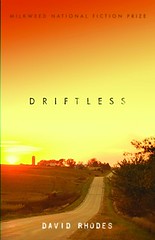 Driftless
Driftless
David Rhodes
![]()
Were some of the descriptive passages less ponderous, were a couple of the male characters more differentiated (I couldn’t tell Jacob and July apart), this would be a solid four-star book, just about my highest rating.
Setting aside my problems with Jacob and July, I loved the characters, the physical setting, the backdrop of farming and rural life. The problems each character deals with are realistic, sometimes quite frightening, and in one case … the cougar … surrealistic and poetic. Every time I picked the book up to begin a new chapter, I’d find myself immediately engaged, eager to jump back into the story.
I wish I had never heard of Garrison Keillor, because there were moments when I’d think “this would make a great Lake Woebegon vignette,” and then some of the sober gravity David Rhodes’ characters had established would vanish and I’d be ashamed of myself for cheapening the read with pop culture comparisons.
There’s one great shock near the end, but in general the characters move upward from conflict and trouble toward resolution, so it is a spiritually satisfying read. Overall, I was very impressed, and I plan to read more by David Rhodes.
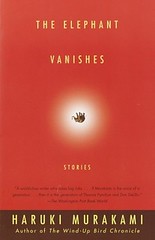 The Elephant Vanishes
The Elephant Vanishes
Haruki Murakami
![]()
I love Murakami’s novels, of which I’ve read four (The Wind-Up Bird Chronicle, Sputnik Sweetheart, Norwegian Wood, and IQ84). I was excited when my book club picked this collection of Murakami’s short stories for a monthly read, and even more excited to find that the first story was the prototype for a later novel.
The accumulation of stories, however, didn’t give me the lift I usually get from a Murakami novel. I didn’t get the book until the week before my book club meeting, so I read the stories in a bit of a rush. One thing that bothered me about the stories, and that made them all seem somewhat the same, was that they were interior. The novels at least combine external action with inner dialog; while there is action in some of these stories, it’s utterly secondary to the narrator’s mental musings.
We all … me and my fellow book clubbers … scratched our heads over the meaning of some of these stories. I’m not sure there is any deeper meaning to them; they’re just stories, quintessentially Murakami, but just stories. I’m happy I read the short stories, but it’s the novels I love, and I still plan to read the rest of them.
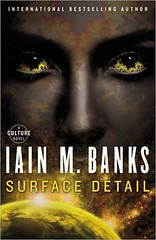 Surface Detail (Culture #9)
Surface Detail (Culture #9)
Iain M. Banks
![]()
This is the 9th of a series of science fiction novels about The Culture, a galactic civilizing force made up of various alien and pan-human entities. It’s the only one of the nine Culture novels I’ve read, and perhaps it was a poor choice for an entry point, because I mostly felt lost … well, not really lost, just not engaged enough to pay close attention to where I was in the novel. Had I been around from the beginning I might have cared more. As it was, I found it a grind getting through this thick, busy novel.
Banks jumps from character to character, from computer-generated hells to wars between evolving and evolved spacefaring civilizations, from individual pan-human characters to double-trunked quadrupeds to artificial intelligences. The human and pan-human characters, at least, get to the point. The AI characters, to a man (and they are all men) dither and blather and bloviate and fucking take forever to say what they mean to say, and like those ticky-tacky houses, they all seem just the same.
The space opera aspects of the novel are satisfying enough, and I rather liked that as things came to an ultimate head Banks shifted from exploding starships to a two-person foot chase and knife fight in the mud next to a canal on the surface of an earth-like planet.
The science Banks relies on for all his magical space opera stuff is probably nonsense, but I wouldn’t know enough to judge that accurately. Most everything seems to happen at the “substrate” level, which sounds like hyperdrive bullshit to me.
Ultimately there’s just too much crammed into this novel, most of it sidebar stuff, not vital to the story itself. Banks takes long breaks from the action to indulge in long expository passages written from the omniscient narrator level. I found myself scanning most of these paragraphs, hurrying to get back to the action, and every time I did I’d find myself on a different planet or ship from the one I was on before.
I did like the ship classes and names, though. Four stars for that. My favorite was the Abominator Class ship Outside the Normal Moral Constraints. I think I’ve got that right.
I should take my own recommendation and try the first Culture novel before giving up on the series, but I’m not in any great hurry to do so. After the effort of getting through this one, I’m ready for a sci-fi break.
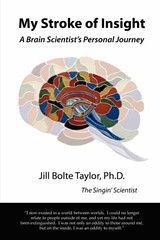 My Stroke of Insight: A Brain Scientist’s Personal Journey
My Stroke of Insight: A Brain Scientist’s Personal Journey
Jill Bolte Taylor
![]()
In addition to being a first-person account of suffering and recovering from a stroke, this is also a self-help book. I don’t see how it would be of any help to stroke victims, since by the time they’ve regained their ability to read they are well on the road to recovery, but it would be a useful reference for someone caring for a stroke victim.
How odd that I would finish this book on the very day I learned one of my favorite authors, Elmore Leonard, has suffered a stroke. Jill Bolte Taylor was 37 when she had hers. Elmore Leonard is 87, and I doubt he’ll have time to rebuild the connections between his left and right brains. But that’s rather off-point, isn’t it?
I was hoping for more of a memoir of the stroke and stroke recovery experience, but the self-help sections of the book muscled a lot of that aside, and Jill Bolte Taylor’s chirpy “singin’ scientist” persona was a little off-putting. She goes over certain points again and again … in fact her repetitiveness drove me into skim mode, so in all it was a pretty quick read.
I must try harder to talk my book club into taking on more challenging projects (he said, tempting the fates to deliver unto him a massive stroke).
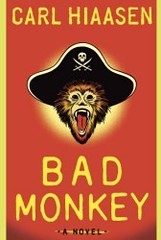 Bad Monkey
Bad Monkey
Carl Hiaasen
![]()
The last Carl Hiaasen novel I read, Star Island, was not very good. Hiaasen, I felt, had become too reliant on his South-Florida-Eccentric-Character shtick, and his writing had grown perfunctory and even lazy.
He’s in better form with Bad Monkey, at least for the first half to two-thirds of the novel. Yes, he’s still doing the SFEC shtick, but his heart’s back in it and Yancy, his lead character, is believable. Incredibly lucky, but believable. The plot and side plots are interesting as well, and I was pulled right along. Nearing the end, however, there’s a long passage where Hiaasen steps in to explain one of the more complex plot resolutions, almost as if he felt it would have been too much trouble to devise some way to integrate the explanation into the flow of action. This was a real disappointment to me.
So … still some laziness. Not that Hiaasen hasn’t earned it, but still. Overall, good Hiaasen, better than the last one, but not up to his earlier novels.
Books I did not finish
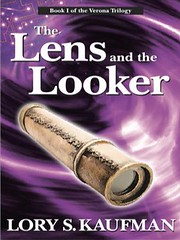 The Lens and the Looker (The Verona Trilogy #1)
The Lens and the Looker (The Verona Trilogy #1)
Lory S. Kaufman
![]()
No rating. I like good YA literature. This is not good YA. Passable, maybe, for a pre-teen audience that hasn’t read anything better, particularly a pre-teen audience that doesn’t mind expository prose. That, right in the first chapter or two, was what did me in: too much telling, not enough showing … as in this sample paragraph:
“‘I wish I knew what era and place they’re sending me,’ Hansum said while slicing the air with his blade. ‘It would be fun to be able to use my sword and riding skills there.’ Besides being part of the college fencing and horseback riding teams, the athletic Hansum had trained at a History Camp a few summers earlier as a Renaissance soldier. Many students spent vacations at History Camp summer jobs, working as enactors, people who lived wholeheartedly as citizens from a bygone era.”
And then it got worse, and I moved on to something better.
 The Lady and the Monk: Four Seasons in Kyoto
The Lady and the Monk: Four Seasons in Kyoto
Pico Iyer
![]()
Read to about the half-way point, then abandoned, so no rating. I hate giving up on a book, especially a book club selection. Here’s why I did:
The quality of Pico Iyer’s writing is excellent, and had I not lived in Japan for three years, and if I were at all interested in Eastern spirituality and Zen, I would probably have finished Iyer’s combination travelogue/memoir. But having lived there, what was once enticingly mysterious is no longer so to me; this, combined with my utter lack of interest in religion and spirituality, resulted in a fitful, restless read.
When it became apparent that what Iyer really wanted to write about was his affair with a married Japanese woman, I sensed the onset of literary Penthouse Forumism and put the book aside.